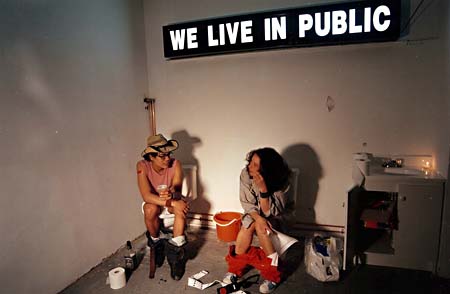
We Live in Public
2009, NR, 90 min. Directed by Ondi Timoner.
REVIEWED By Marc Savlov, Fri., Oct. 9, 2009
In the early 1980s, Josh Harris, a young, smart, tech-savvy Nerd Yorker, developed an intense – and as it turns out, prophetic – interest in the emerging shadow-space that was the newborn Internet. Harris parlayed that prescience and what little money he had into a proto-start-up company named Jupiter. It crunched numbers and created as-yet-nonexistent data regarding the potential profitability of this craven new connectivity and then sold that data to venture capitalists and businessmen. And for Harris, the original dot-com visionary kid, the money rolled right in, some $80 million of it, which he then used to fund a series of Internet-based social experiments that were by turns radical, trenchant, exciting, and, ultimately, disastrous, not to mention depressing. First came Pseudo, the first streaming Internet television network (60 Minutes dropped by to do a piece on its own alleged death knell), and then there was Quiet, in which the cash-flush Harris transformed some vacant NYC cellar/loft space into a communal living experience that was monitored in every conceivable way by a medusan network of CCTV cams. Everything everyone did for the month preceding the arrival of the new millennium (once you signed up, you were most definitely not free to leave) was recorded and then re-fed, live, into the television-centric "pods" where Quiet's participants lived, slept, had sex, bathed, took drugs, ad nauseam. What was envisioned as a minitechnotopia instead became, in 30 days time, a hellish freak show that, consciously or not, echoed the Stanford Prison Experiment, Orwell's 1984, and even Auschwitz. The NYPD shut down Quiet on Jan. 1, 2000, but Harris, a compulsive explorer of the ether's netted but fragile borders, wasn't even close to finished. His next project, the titular We Live in Public, found Harris and his girlfriend, Tanya Corrin, moving into a loft and live-streaming every aspect – it's amazing how boring and banal their actual physical existence appears – while monitoring and engaging an online chatroom audience composed of thousands of strangers. This experiment, too, was an exercise in slow-spiraling psychological destruction. Harris and Corrin's relationship eventually succumbed to the 24/7 push-pull of their voyeur/exhibitionist lifestyle. By the end, Harris was broke and alone, but not bereft of ideas. Like the cruddy Sixties sitcoms on which he was raised (particularly Gilligan's Island, itself a meta-wacky exercise in communal living while being watched by millions of strangers), Harris' ever egocentric social experiments continue to this day. Timoner, who also directed the now-classic rocker doc Dig!, makes a bold and trenchant argument, via Harris' pseudomorphically perverse life, that we are all now "slaves to little boxes," and it's true, Tweetpeeps, isn't it? There is no personal space in MySpace (although the company would love for you to believe otherwise) or real, live, unsculpted faces on Facebook (ditto), and, as Harris notes, Warhol's 15 minutes of fame per lifetime has been renormed to 15 minutes per day. Harris' thought-provoking performance art/life isn't yet over, but by film's end he's become unplugged, both literally and metaphorically. To paraphrase Dylan Thomas: Rage, rage against the dying of the life, and rage against the machine while you're at it. (Timoner will attend the evening shows on Friday and Saturday.)
A note to readers: Bold and uncensored, The Austin Chronicle has been Austin’s independent news source for over 40 years, expressing the community’s political and environmental concerns and supporting its active cultural scene. Now more than ever, we need your support to continue supplying Austin with independent, free press. If real news is important to you, please consider making a donation of $5, $10 or whatever you can afford, to help keep our journalism on stands.
Josh Kupecki, Oct. 28, 2022
Richard Whittaker, March 15, 2019
Aug. 7, 2022
April 29, 2022
We Live in Public, Ondi Timoner









